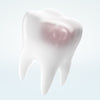Braces such as Invisalign and retainers are becoming increasingly common. As braces are designed to realign your teeth, some discomfort can be expected. But what causes increased pain and sensitivity and what can you do about it? This article aims to answer your questions surrounding braces, Invisalign, sensitive teeth and pain associated with braces. Discover the best way for caring for sensitive teeth with braces, as well as how to keep your braces clean and hygienic for continual use.
Why do I have Invisalign pain and retainers pain?
There are various reasons as to why you may be experiencing pain and sensitivity in your teeth. Dentin hypersensitivity, which can be caused by the erosion of tooth enamel, is one example. It can be treated with an appropriate product like Regenerate™ Hypersensitivity Toothpaste which is clinically proven to treat hypersensitivity and pain. With its patented technology, the toothpaste helps to formulate fresh enamel minerals that activate enamel regeneration, helping to create strong teeth and provide relief from and stop pain and sensitivity.
Other causes of tooth pain could be from your braces or retainers themselves. Some of the most common causes for this type of pain are listed below. Speak to your dentist for advice on how to manage any discomfort you experience from your braces or retainers or if you are worried.
- Your teeth are adjusting: Braces are designed to realign your teeth, and so some pain and discomfort will be normal as your teeth move into the desired place. If you have retainers, pain can occur within the first few days as your teeth get used to the process.
- Your retainer may be dirty: Plaque is a thin film containing bacteria that coats your teeth. If not cleaned properly, plaque can build up and damage the enamel – the protective layer of your teeth, creating pain and sensitivity. These same bacteria can grow on your retainer. It’s therefore important to regularly clean your braces, to reduce retainer pain and Invisalign sensitivity.
- If your retainer or Invisalign doesn’t fit properly: If you find your retainer hurts or your Invisalign hurts, it may be that it doesn’t fit properly. A poorly fitting retainer can irritate gums and damage your gums and teeth. If you are experiencing discomfort from your retainer or you’re worried it doesn’t fit properly, let your dentist know as they should be able to provide a solution.
- You already have sensitive teeth: If you have a retainer or Invisalign, sensitivity may be increased as the position of your teeth changes. This type of sensitivity should only last a couple of days and can be treated with over-the-counter medication – just be sure to read the instructions and consult a doctor if you are unsure.
It’s important to note that if your retainer hurts significantly, or if you are experiencing prolonged Invisalign pain, particularly if you have had no previous problems with your braces, then you should contact your dentist so they can assess the situation.
How to manage and prevent Invisalign pain and retainers pain
While the chances of experiencing pain and sensitivity may increase if you have braces, there are ways to prevent and manage the pain. Below is listed some of the best ways to do this but be sure to speak to your dentist about these issues as they will be able to provide tailored solutions to the problem.
- Clean your retainer: As we have seen, Invisalign retainers and metal retainers are prone to bacteria build-up if not cleaned regularly. Cleaning your braces will help to prevent additional pain and sensitivity and will help you to maintain good oral hygiene. Speak to your dentist about the best way to clean and care for your braces.
- Think about what you’re consuming: As your teeth are going through changes, particularly soon after you have had your braces fitted, they may become more sensitive to hard foods. Initially aim for soft foods and liquids that are gentler on your teeth.
- Over-the-counter medication: If your retainer or Invisalign hurts, taking over-the-counter medication, such as Ibuprofen, should help to ease any pain and swelling you have. Remember to read the label carefully and if the pain doesn’t subside within a few days, contact your dentist.

How to manage teeth sensitivity
If you suffer from sensitive teeth – which may contribute to other causes of dental pain – then simply choosing the right products could help. A soft-bristled toothbrush is recommended for people with sensitive teeth as hard-bristled brushes can damage your enamel. You should also use a toothpaste specifically designed to help tackle tooth pain and sensitivity to ensure they stay strong and to prevent discomfort – such as Regenerate™ NR-5+ Hypersensitivity Toothpaste. While this will not treat any pain or sensitivity caused by braces and retainers, it can treat hypersensitivity and stop the pain caused by it.
This article is not intended to replace advice from your dentist. If you are experiencing intense or prolonged pain, or increased sensitivity, be sure to contact your dentist.


